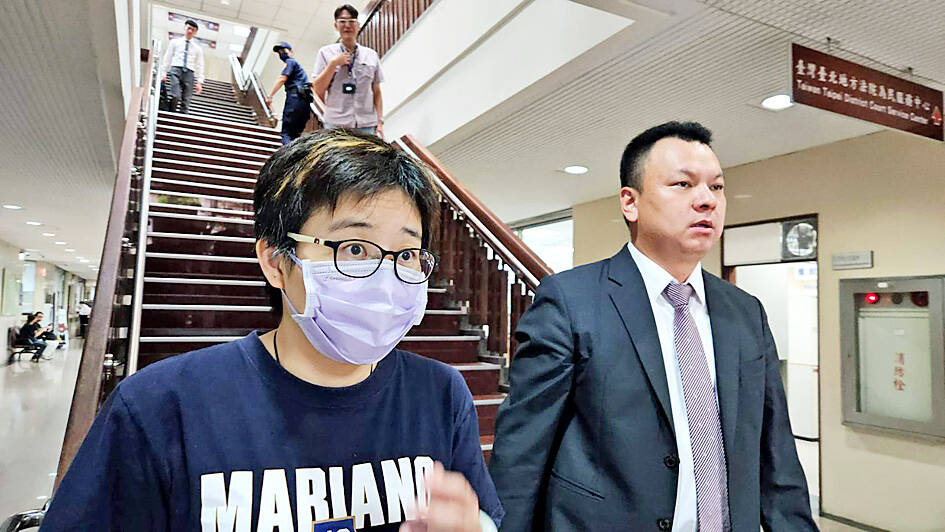The Constitutional Court yesterday ruled that insulting public officials is punishable under the Constitution, while defaming a public office is not.
The court sent a case about criticism of an official back to the Taiwan High Court for a retrial based on the interpretation.
The defendant, Yang Hui-ju (楊蕙如), in 2022 was found guilty of contravening Article 140 of the Criminal Code after Yang allegedly paid people to post criticism online of the Taiwan Economic and Cultural Office’s Osaka branch over its handling of evacuations of Taiwanese from Japan following a 2018 typhoon.

Photo: Wen Yu-te, Taipei Times
Su Chii-cherng (蘇啟誠), who was director-general of the office at the time, committed suicide in his residence shortly after the criticism began.
Article 140 stipulates a prison sentence of up to one year or a fine of up to NT$100,000 for “insult[ing] a public official during the discharge of his legal duties or publicly mak[ing] insults about his discharge of such legal duties.”
The office was accused by members of the public of failing to offer aid to Taiwanese when Kansai International Airport flooded when Typhoon Jebi hit Japan in 2018.
Yang sought a constitutional interpretation, saying that Article 140 contravenes constitutionally guaranteed free speech.
At a discussion at the Constitutional Court last year, a Ministry of Justice representative said that insulting public officials was not a crime unique to Taiwan and that those working on behalf of the country should be protected.
The Constitutional Court said that Article 140 has two parts, one referring to “slandering or defaming a public official” and one to “slandering or defaming a public office.”
Regarding the former part, if defamation is immediate and intended to obstruct an official, it should be punished, which would not contravene Article 11 of the Constitution, it said.
Article 11 says: “The people shall have freedom of speech, teaching, writing and publication.”
However, people are entitled to question, criticize or comment on the decisions of an office, as this is a part of democracy and civic oversight, it said.
Even if a member of the public were to simply curse the office or direct vulgar language at it as a means of venting their frustration, it would still be within their free-speech rights, it said.
It is difficult to imagine public defamation of an office having any immediate or noticeable effect on public officials carrying out their jobs, so criminalization under Article 140 would contravene the Constitution, it added.
Additional reporting by CNA

Nipah virus infection is to be officially listed as a category 5 notifiable infectious disease in Taiwan in March, while clinical treatment guidelines are being formulated, the Centers for Disease Control (CDC) said yesterday. With Nipah infections being reported in other countries and considering its relatively high fatality rate, the centers on Jan. 16 announced that it would be listed as a notifiable infectious disease to bolster the nation’s systematic early warning system and increase public awareness, the CDC said. Bangladesh reported four fatal cases last year in separate districts, with three linked to raw date palm sap consumption, CDC Epidemic Intelligence

The manufacture of the remaining 28 M1A2T Abrams tanks Taiwan purchased from the US has recently been completed, and they are expected to be delivered within the next one to two months, a source said yesterday. The Ministry of National Defense is arranging cargo ships to transport the tanks to Taiwan as soon as possible, said the source, who is familiar with the matter. The estimated arrival time ranges from late this month to early next month, the source said. The 28 Abrams tanks make up the third and final batch of a total of 108 tanks, valued at about NT$40.5 billion

Two Taiwanese prosecutors were questioned by Chinese security personnel at their hotel during a trip to China’s Henan Province this month, the Mainland Affairs Council (MAC) said yesterday. The officers had personal information on the prosecutors, including “when they were assigned to their posts, their work locations and job titles,” MAC Deputy Minister and spokesman Liang Wen-chieh (梁文傑) said. On top of asking about their agencies and positions, the officers also questioned the prosecutors about the Cross-Strait Joint Crime-Fighting and Judicial Mutual Assistance Agreement, a pact that serves as the framework for Taiwan-China cooperation on combating crime and providing judicial assistance, Liang

A group from the Taiwanese Designers in Australia association yesterday represented Taiwan at the Midsumma Pride March in Melbourne. The march, held in the St. Kilda suburb, is the city’s largest LGBTQIA+ parade and the flagship event of the annual Midsumma Festival. It attracted more than 45,000 spectators who supported the 400 groups and 10,000 marchers that participated this year, the association said. Taiwanese Designers said they organized a team to march for Taiwan this year, joining politicians, government agencies, professionals and community organizations in showing support for LGBTQIA+ people and diverse communities. As the first country in Asia to legalize same-sex